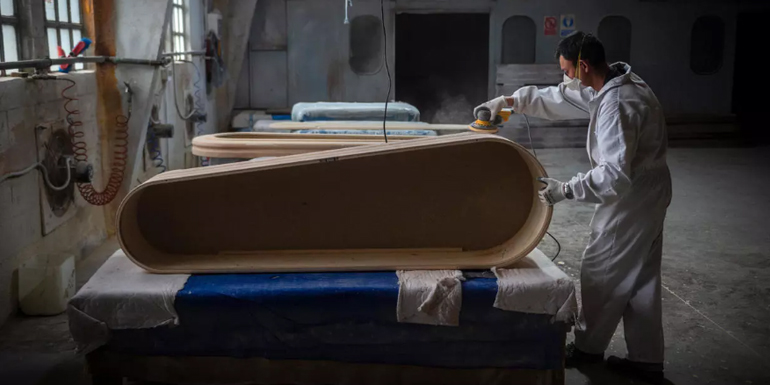The import halt on coffins from China has led to this Spanish town of Piñor doubling production and adapting product lines to keep up with demand.
A town built on coffin production
For generations the village of Piñor, in the northwestern Spanish region of Galicia, has been producing quality coffins. However, in the past decade the town went from thirteen coffin producing factories to nine. According to the mayor of the town mainly due to “dirt-cheap” import coffins.
Over the years some coffin makers from Piñor retired and others struggled to get business due to the increasing competition from China.The unbeatable low-price import from had left this town unable to compete. However, because of the corona crisis massive imports of chipboard caskets below $108 (€100) have been halted due to import restrictions. All eyes are now on the village of Piñor to supply the huge demand of coffins in Spain.
Joaquín Vázquez, the owner of a factory in Ribadavia near Piñor, said that at his factory the shifts are doubled and his employees are working on the weekends as well. His team produces now double the amount of caskets.
Adapting under pressure
The factories are also adapting to the death care industry of today and created a new product offering of a “basic model” casket meant solely for cremation. “They have flat lids, smooth sides and wooden handles. They feature water-based varnish and have no iron or glass parts, or moldings of any kind,” said José Luis González Rodríguez, Mayor of Piñor and vice-president of the Association of Coffing Manufacturers of Galicia.
New hope for a local economy
Because of travel and import restrictions factories in many countries have shifted focus to the local market. In addition factories, like the ones in Piñor, have adapted their production lines in order to provide strictly what’s needed. The crisis might just be the thing that shakes up the funeral supply industry and makes funeral product suppliers look at a more agile production line to compete with companies that export their coffins halfway across the world for lower prices.
